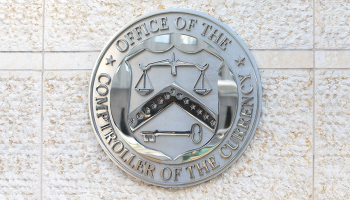Democrats Push to Reverse OCC’s ‘True Lender’ Rule
The OCC introduced rules last year to ‘clarify’ which entities were responsible for loans
- |
- Written by Banking Exchange staff

Democratic Party members have tabled legislation seeking to overturn the Office for the Comptroller of the Currency’s (OCC) changes to ‘true lender’ rules introduced last year.
Senator Chris Van Hollen, Representative Chuy Garcia, and Senate Banking Committee chair Sherrod Brown put forward the legislation on March 25 to repeal the change using the Congressional Review Act, which allows new rules to be reversed by a simple majority.
The OCC proposed the change last year in an effort to formalize the legal framework around which entities are ultimately responsible for loans.
Banks often sell books of credit or loans such as credit card debt through securitizations. These transactions allow banks to issue more credit and support more borrowers. However, such deals have also created uncertainty about which party is ultimately responsible for the loan, the OCC said in its proposal.
Several state attorneys challenged the true lender rule, arguing that it conflicted with existing laws and that the OCC was not permitted to pre-empt state laws under existing legislation.
The states also said the move conflicted with its policy against ‘rent-a-bank’ schemes. These are usually lending arrangements set up by companies using an out-of-state bank not subject to local interest rate limits.
The state attorneys argued that the OCC’s plan would remove protections against this. The Center for Responsible Lending in an August 2020 article accused the OCC and the Federal Deposit Insurance Corporation of planning to “trample state laws and invite a flood of rent-a-bank schemes across the country”.
Congress has until mid-May to pass the resolution to effectively annul the OCC’s rule change, according to lawyers at Mayer Brown. If it fails to meet this deadline, it would be up to the as yet unknown next Comptroller of the Currency to review the true lender rule change.
“If Congress passes the resolution of disapproval and President Biden signs it into law, it would effectively restore the various pre-rule, court-created standards for determining the true lender under certain bank partner programs involving national banks and federal savings banks,” Mayer Brown’s Andrew Olmem, Jeffrey Taft and Eric Mitzenmacher wrote in a note published late last week.
“It would also create uncertainty about the OCC’s legal authority to issue a new rule in the future on when a national bank or federal savings association is the lender of a loan.”
Tagged under Compliance, Duties, Compliance Management, Compliance/Regulatory, Consumer Compliance, Feature3, Feature, Fair Lending,













